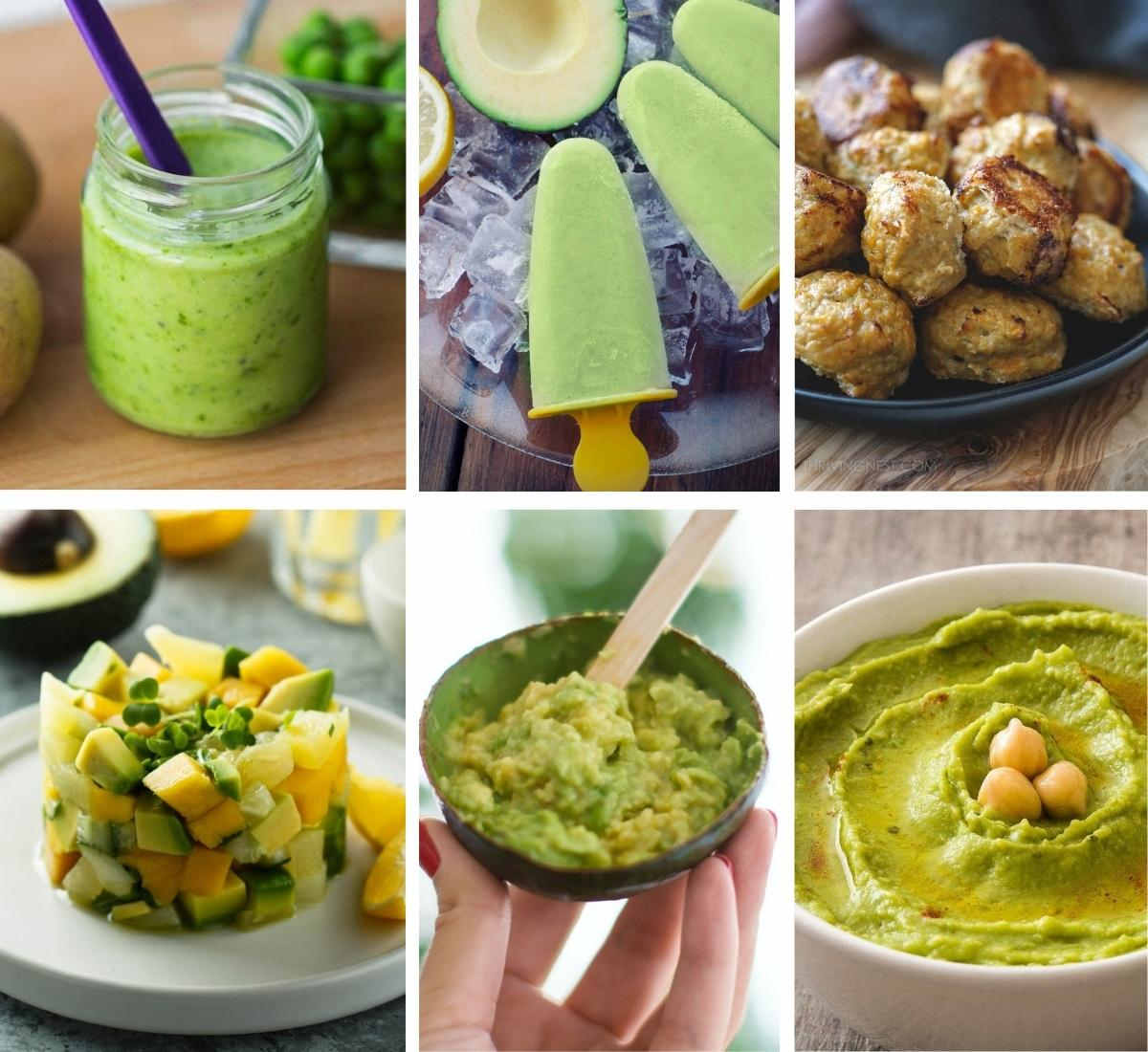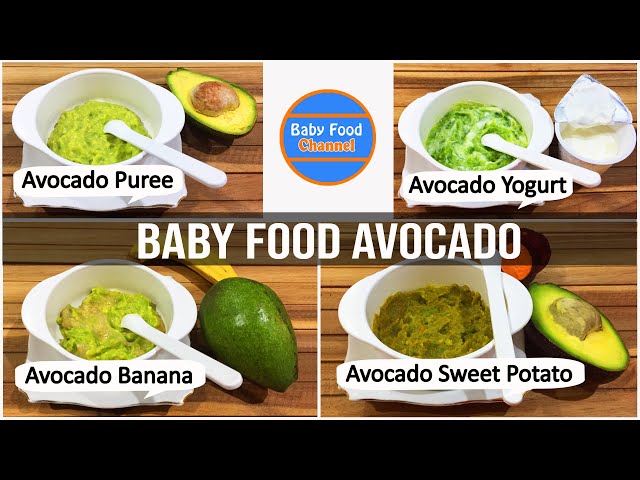The Ultimate Guide: What to Mix With Avocados for Nutritious Baby Food
Introduction
Introducing solid foods to your baby's diet is an exciting milestone. However, it comes with the challenge of ensuring the meals are balanced, digestible, and nutrient-rich. One of the best ingredients you can add to your homemade baby food is the superfood, avocado. This guide elucidates why avocados are excellent for baby food, when and how to introduce them, fabulous mixtures to try, and critical precautions to take.

Why Include Avocados in Homemade Baby Food?
The decision to enrich your baby's homemade meals with avocados bears a swath of benefits that go beyond just their creamy texture and delectable taste. Here's a rich tapestry of reasons that justify the bequest of avocados in your baby's daily nutrition:
1. Rich Nutrient Profile: Avocados are laden with an array of crucial nutrients such as potassium, fiber, healthy fats, vitamins A, C, E, K, and a gamut of B-vitamins that collectively contribute to your baby's healthy growth.
2. Promote Nutrient Absorption: The fiber and healthy fats in avocados facilitate better nutrient absorption in your little one's body, thereby maximizing the benefits of the meal.
3. Immune System Support: The high vitamin content in avocados fortifies your baby's immune system, helping them withstand infections and illnesses.
4. Brain Development: Avocados are touted for their nutrient attributes that aid in the healthy development of the baby's brain.
5. Satiating Yet Delicious: Avocados are appetizing and satiating, thanks to their distinct creamy texture and mild flavor that tickles the baby's taste buds, making meal times enjoyable.
In essence, the integration of avocados in your homemade baby food translates to a power-packed, nutrient-rich, and enjoyable meal your baby will relish.
How and When Should You Introduce Avocados to Your Baby's Diet?
Introducing avocados to your baby's diet is a significant step that can be initiated when the baby is around 6 months old, as suggested by many pediatricians.
The method of introduction of this superfood into your baby’s diet can be broken down into a couple of easy-to-follow steps:
1. Starting Small: Initially, offer your baby only a small spoonful of avocado. This small quantity will help in gauging your baby’s reaction to a new food item.

2. Look out for Reactions: Watch out for any signs of allergic reactions in your baby for a span of 2-3 days post the introduction. This attention to detail is essential while introducing any new food.
3. Slow Progression: If there is no sign of allergy or discomfort in the baby, you can proceed by gradually increasing the avocado quantity in your baby's meals.
4. Mashing is Crucial: Ensure that the avocado is well-mashed until it achieves a creamy consistency. This technique ensures easy swallowing and prevents possible choking hazards.
It’s essential to understand that each baby is unique, and their sensitivities towards food may significantly vary. Always take your baby's tolerance and acceptance into account when introducing new foods into their diet. Following these steps diligently can make the exploration of new tastes both safe and a joyous experience for your baby.
What Are Some Remarkable Mixtures You Can Try with Avocados for a Balanced Baby Diet?
Creating a balanced diet for your baby includes diversify the ingredients in their meals. Avocados are versatile, and they can be mixed with a variety of other foods. Here are some exciting and nutritional combinations you can explore:
Avocado and Fruit Combinations: A Delightful Mix
Are you wondering whether you can mix avocados with fruits in your baby's food? The answer is a resounding yes! Paired with fruits, avocados provide a nutrient-loaded symphony of flavors that your baby can enjoy. Here are some fruity combinations to try:
- Avocado and Banana: This mixture provides a healthy dose of potassium and vitamin C.
- Avocado and Apple: High in fiber, this duo aids digestion and provides essential vitamins.
- Avocado and Pear: This combo is a great source of vitamin C and fiber.
- Avocado and Berries: This exciting mix is rich in antioxidants and essential vitamins.
Avocado and Vegetable Combinations: A Nutrient-Packed Melody
Yes, mixing avocado with vegetables for your baby's meal is excellent. The combination offers a vegetable profusion packed with antioxidants, vitamins, and minerals. Here are some combos to get you started:
- Avocado and Sweet Potatoes: Rich in vitamin A and C, this combo supports the immune system and eye health.
- Avocado and Peas: A source of protein and vitamins A, C, and K.
- Avocado and Carrots: This duo provides a hefty dose of beta-carotene, essential for eye health.
Avocado and Protein Enriched Combinations: Building Blocks for Growth
Avocado's versatility shines when it comes to creating protein-rich combinations. Pairing avocado with various protein sources provides your baby with the essential building blocks for growth. Here are a few examples:
- Avocado and Pureed Meats: Try pureed chicken or beef to diversify your baby's protein sources.
- Avocado and Lentils: This combo can be a great introduction to legumes, offering fiber, iron, and protein.
- Avocado and Split Peas: A fiber-rich combo that is also a good source of protein.
By incorporating avocados into your baby's meals in these exciting combinations, you are ensuring a well-rounded introduction to varied flavors and a balanced nutrient intake.
How Does Avocado Help in a Smooth Transition to Solid Foods for Babies?
Transitioning infants from breast milk or formula to solid foods can be quite challenging. However, the inclusion of avocado in your baby's weaning diet can significantly simplify this exciting process. Here's how:
- Scrumptious, Creamy Texture: Avocado's inherent creamy and soft texture is easy for babies to eat, making it an ideal first solid food.
- Neutral Flavor Profile: Avocado has a mild taste, which isn't overpowering for a baby's developing palate. This neutral flavor allows it to be mixed with a variety of foods, helping your baby to acclimate to new tastes gradually.
- Fiber-Rich: With nearly 7 grams of fiber per 100-gram serving, avocados promote good digestive health and can help prevent constipation during the transition to solid foods.
- Adaptable to Texture Changes: As your baby becomes comfortable with solids, you can gradually shift from fully-mashed avocados to chunkier versions. This flexibility helps your baby get accustomed to the texture of solid foods.
In sum, the versatility of avocados makes them a nutritional powerhouse and a useful tool during the weaning stage. Its creamy texture, mild flavor, high fiber content, and gradual adaptability to texture changes ensure a smooth and hassle-free transition for your baby to solid foods.
What Are Advisable Feeding Precautions While Trying Out Avocado-Based Baby Foods?
Incorporating avocado-based foods into a baby's diet can significantly improve their health. However, it is important to consider specific precautions to ensure a smooth dietary transition and protect against potential hazards.
Here are some of the key precautionary measures while introducing avocado in your baby's dietary routine:
- Maintaining Hygiene: Always wash your hands and kitchen utensils thoroughly before preparing baby food. Unhygienic conditions can potentially introduce harmful bacteria to the food, leading to infections.
- Allergy Detection: When first introducing avocado, start by offering small quantities to observe any possible allergic reactions like rashes, vomiting, or diarrhea. If your baby shows no symptoms, gradually increase the portion size.
- No Added Sugars or Artificial Ingredients: If opting for commercially-prepared avocado baby foods, choose ones without added sugars or artificial preservatives. Natural, organic food is easier for your baby’s digestive system.
- Diversified Diet: Avocados are nutrient-rich, but they should not form the entirety of your baby's diet. Ensure your baby continues to receive a varied diet that includes other fruits, vegetables, and proteins for balanced nutrition.
By adhering to these precautions, you can ensure that your baby enjoys the numerous health benefits of avocado-based foods while minimizing potential risks. Always remember to consult with a pediatrician or dietitian if you have concerns or doubts regarding your baby's diet.
Conclusion
Avocado is an excellent addition to your baby's diet due to its rich nutrients profile, taste, texture, and adaptability. Starting it as one of the first foods and pairing it with a variety of fruits, vegetables, and proteins can ensure your baby receives diverse flavors and balanced nutrition. However, remember to always observe hygiene and monitor for any allergies.
Related FAQs about what can i mix with avocado for baby food
What is the right age to introduce avocados to a baby’s diet?
Avocados can be introduced when your baby is around 6 months old, as part of their initial transition to solid foods. However, it's recommended to consult with your pediatrician or dietitian before introducing any new food item into your baby's diet.
Can avocados be frozen for later use in baby food?
Yes, avocados can be frozen for later use in baby food preparation. Freezing doesn't compromise the nutrient content, though it may slightly alter the texture. It's recommended to mash the avocado before freezing for a smooth consistency.
Are there any possible allergic reactions to be aware of while feeding avocados to babies?
Allergic reactions to avocados in babies are rare, but possible. Symptoms to watch out for include rashes, vomiting, or diarrhea. If any such symptoms appear, immediately stop feeding avocado and consult your pediatrician.


